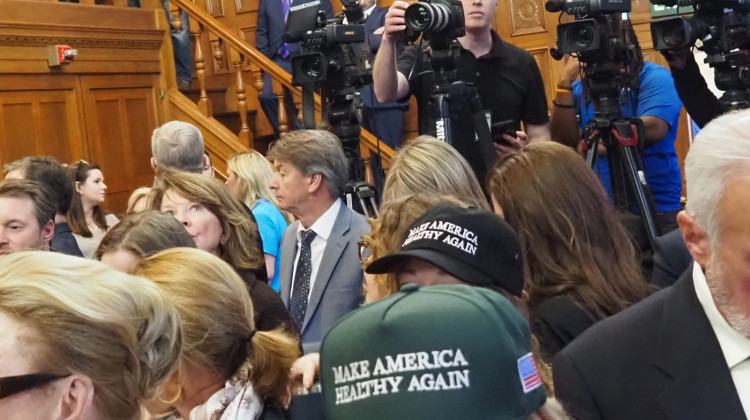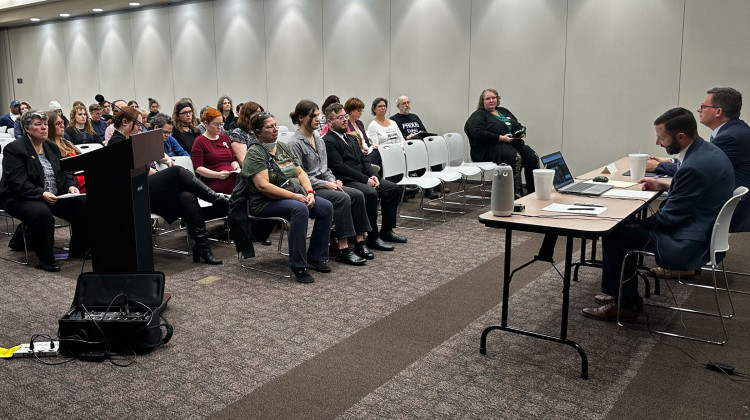Updated on April 11, 2023
People in Indiana could save up to $2 billion dollars in health care costs if non-critical access, non-profit hospitals lower their prices to the national average, according to a new analysis by the Employers Forum of Indiana.
The analysis found that non-profit, non-critical access hospitals collected 76 percent of the commercial patient revenue in the state. A legislative cap on hospital prices would impact this big chunk of healthcare expenditure and potentially make a big dent, said Gloria Sachdev, the president and CEO of the Employers Forum of Indiana.
“While the hospital systems want to put the rural hospitals in front of this conversation, as we're talking about health care costs, they [themselves] are the biggest contributors to the the high prices of health care in Indiana, and that's where the biggest opportunity is for savings,” Sachdev said.
According to the analysis, those cost savings would come if even just the five biggest health systems in the state –– Indiana University Health, Franciscan Health, Parkview Health, Community Health Network and Ascension Health –– lowered their prices to meet the national average, which the analysis defines as 260 percent of what Medicare pays for the same services.
The EFI analysis found that Indiana hospitals charged more than three times what Medicare paid in 2020. The analysis used data from a RAND Corporation study from last year which looked at medical claims from 2018 to 2020.
The $2 billion dollars in savings would slash the net income for Indiana’s non-profit hospitals from $3.5 billion to $1.5 billion, according to the analysis. Sachdev said that these hospitals are operating on “really high” profit margins to begin with.
But hospital leaders take issue with the financial analysis. Brian Tabor, the president of the Indiana Hospital Association, said that the use of Medicare reimbursement as a benchmark does not lend to an accurate comparison or assessment of Indiana’s hospital prices.
He said that the 260 percent figure would “have devastating impacts” on Indiana hospitals and “is just not the way to set good policy.”
“Some groups are going to say that, ‘We should have an immediate cut of $2 billion to the health care ecosystem’,” Tabor said during a Senate committee hearing on March 29 on HB 1004. “They’re not going to be the ones that will have to operationalize it, they’re not going to have to make tough decisions about what to cut, and they won’t be the ones who get the blame when those decisions are made.”
Tabor pointed to other issues like the low reimbursement rates that insurers provide physicians in Indiana. According to the RAND study, Indiana physicians receive the 4th lowest reimbursement rates in the country.
“If we talk about all of these other pieces, Medicaid [reimbursement], physician rates… maybe we can get to a place that is a more holistic solution. But it’s not going to come from a pounding on hospitals,” Tabor said.
Health care prices have been a point of contention this legislative session. Republican lawmakers introduced several House and Senate bills that aim to chip away at the high health care costs in the state. Hospitals have been a main target.
Several bills aim to eliminate certain hospital fees, cap how much they can charge and free physicians from non-compete agreements imposed by hospitals. Some of those bills exempt rural and critical access hospitals.
Contact Farah at fyousry@wfyi.org. Follow on Twitter: @Farah_Yousrym
CORRECTION: A previous version of this story said the RAND Corporation study is based on data from 2018 only. That was incorrect. The study is based on data from 2018 to 2020.
CLARIFICATION: The EFI analysis that found Indiana hospital prices are more than three times what Medicare pays is based on 2020 data only.
 DONATE
DONATE







 View More Articles
View More Articles


 Support WFYI. We can't do it without you.
Support WFYI. We can't do it without you.